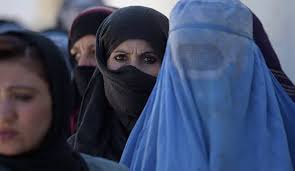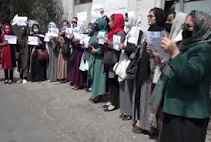Challenges of Afghan women after Taliban rule

After the rule of the Taliban in Afghanistan, Afghan women have faced many challenges. These challenges have had a profound impact on their daily lives, rights and freedoms. Some of the most important of these challenges are:
-
Educational limitations:
- Prohibition of education: The Taliban have closed girls’ schools and prohibited girls from studying at levels above primary school.
- Academic restrictions: Women are also prohibited from studying in universities or face severe restrictions.
-
Job limitations:
- Prohibition of work: Many women are prohibited from working in the public and private sectors.
- Professional restrictions: Even in jobs where women are allowed to work, working conditions face severe restrictions and gender segregation.
-
Social and cultural limitations:
- Compulsory covering: Women are forced to observe strict covering and wear burqa.
- Restrictions on movement: Women need to be accompanied by a male mahram to leave the house and cannot travel alone.
-
Violation of human rights:
- Violence and abuse: An increase in cases of sexual and physical violence and abuse against women has been reported.
- Lack of legal protection: Women have limited access to legal protection and face injustice in cases of family or social violence.
-
Health restrictions:
- Restriction in access to health services: Women’s access to health and medical services is limited, especially in remote areas.
- Health restrictions: Women face severe restrictions regarding reproductive health and special care.
-
Psychological and social effects:
- Depression and anxiety: Increased cases of depression, anxiety and mental problems in women due to difficult living conditions and social restrictions.
Social isolation: Women have experienced social isolation and reduced social interactions due to social and cultural restrictions.

The future of Afghan women under the rule of the Taliban
The future of Afghan women under the rule of the Taliban is unknown and faces many challenges. Due to the policies and actions of the Taliban since regaining power in August 2021, Afghan women face severe restrictions in various areas of life. Some of the factors and conditions that can affect the future of women under Taliban rule are:
- Education:
- Continuation of restrictions: If the Taliban continue their policies in the field of limiting the education of girls and women, the possibility of education for them will be very limited, which will have long-term negative effects on future generations.
- International Efforts: If international pressure increases to reopen schools and universities for women, changes may be made.
-
Employment and work:
- Employment restrictions: With the continuation of the current restrictions, women will continue to be deprived of job opportunities, which leads to a decrease in their economic independence.
- Innovations and local solutions: In some areas, women may seek to create small and local businesses with the support of non-governmental and international organizations.
-
Social rights and freedoms:
- Continuation of suppression: If the Taliban continue with their strict policies, women will continue to face severe restrictions in social and cultural fields.
- Human rights activities: The activities of human rights organizations and women’s movements can help change the situation, although it will be associated with great risks and challenges.
- Hygiene and health:
- Limited access to health services: Persistence of health restrictions can endanger women’s health, especially in the areas of reproductive health and medical care.
- International support: Increasing international support to provide health services to women can have positive effects.
- Political and social roles:
- Exclusion from the public space: The continuation of Taliban policies will mean the exclusion of women from the public space and political and social decisions.
Resistance and underground activities: Some women may engage in underground activities and efforts for social and political changes, which are associated with many risks.
- Exclusion from the public space: The continuation of Taliban policies will mean the exclusion of women from the public space and political and social decisions.
Conclusion:
The future of Afghan women under Taliban rule is highly dependent on political and social changes inside and international pressures. Although the current perspective is worrying, the efforts and resistance of Afghan women and international support can play an important role in changing this situation. The support of the international community, human rights organizations and other countries is necessary to improve the situation of women in Afghanistan.
